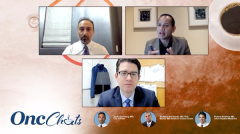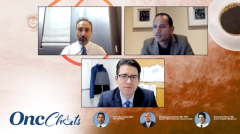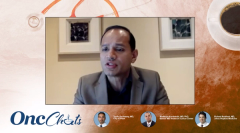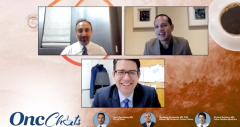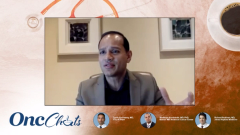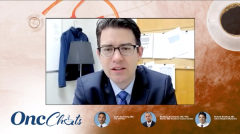
Taking Organoids From Bench to Bedside Through Endoscopy in Pancreatic Cancer: Success of Growing Organoids
In this fourth episode of OncChats: Taking Organoids From Bench to Bedside Through Endoscopy in Pancreatic Cancer, Toufic A. Kachaamy, MD, Madappa Kundranda, MD, PhD, and Richard Burkhart, MD, shed light on the process of obtaining sufficient tissue through endoscopic ultrasound–guided biopsies to generate organoids.
Episodes in this series

In this fourth episode of OncChats: Taking Organoids From Bench to Bedside Through Endoscopy in Pancreatic Cancer, Toufic A. Kachaamy, MD, of City of Hope, Madappa Kundranda, MD, PhD, of Banner MD Anderson Cancer Center, and Richard Burkhart, MD, of Johns Hopkins Medicine, shed light on the process of obtaining sufficient tissue through endoscopic ultrasound–guided biopsies to generate organoids.
Kachaamy: I assume the [patients] with localized disease [are] getting chemotherapy in anticipation of surgery, and the tissue is obtained by endoscopic ultrasound. Can you comment on how successful we are in getting enough tissue to grow organoids with endoscopic ultrasound? [Can] you [also] give some tips to the endoscopist as [to] what you would like them to do when you’re asking that question?
Burkhart: That's a great question. It turns out that the amount of tissue obtained by endoscopic ultrasound–guided biopsies is plenty sufficient to generate an organoid from. In fact, depending on the endoscopist it can be superior to an approach in which an organoid is grown from a surgery itself. In general, about 80% of patients [who] go through endoscopic FNA or FnB can have their biopsies grown into an organoid.
When we think about the keys to success [for this], there are a couple. The first is that at some point, the amount of tissue does matter. As the newer biopsy needles come down the pike, and we’re getting more access to tissue from our endoscopic approaches, [we have seen] an increase in the success rate of organoid development. The second key [to all of this] does seem to be the experience of the endoscopist to some extent. To have an endoscopist who has done a lot of these and can put the needle straight through the tumor is very helpful. When an organoid fails, the most common reason it fails is because it grows out normal pancreas. As the endoscopist gets more and more experienced and is able to put the needle [directly through the tumor] and sample only the cancer, that failure rate can be reduced.
Kachaamy: Do you have any tips on how many passes [are needed, or what] size needles [are preferred]? Do you like cores, anything like that?
Burkhart: In all honesty, over the past half decade or so, we’ve evolved and used everything from fine needle aspirates to biopsy cores. As such, we really have a technique in growing and establishing organoids that can be utilized in a variety of settings. From that standpoint, I will usually tell an endoscopist or discuss with an endoscopist that if they have a needle of choice, or if they have something that they feel like they have a ton of control over or are very well experienced with, [then] that is fine for me. We don’t necessarily need cores, [and] we don’t necessarily need aspirates. Both approaches can work.
Kachaamy: The most important [thing] would be to try to get as much exclusive tumor as possible.
Burkhart: That’s exactly right. We’ve grown organoids successfully from single passes. We have a clinical trial that was designed almost solely from single pass organoids. In general, if we get two, we tend to be happy [because] it gives us two [chances] to get it in instead of just one.
Check back next Thursday for the next episode in the series.
Register for the upcoming Advances and Innovations in Endoscopic Oncology and Multidisciplinary Gastrointestinal Cancer Care meeting:


